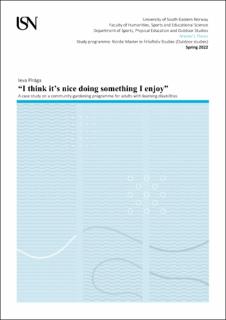“I think it’s nice doing something I enjoy”: A case study on a community gardening programme for adults with learning disabilities
Master thesis
Permanent lenke
https://hdl.handle.net/11250/3009034Utgivelsesdato
2022Metadata
Vis full innførselSamlinger
Sammendrag
The relationship between direct nature engagement and the positive outcomes on public health has been widely researched in the context of community gardening. Gardening activities are considered a means of being exposed to nature through intentional, goal-oriented activities with various factors that shape the gardening experiences for the groups the programmes are designed for. The research that has employed qualitative approach on health promotion gardening programmes concerning the vulnerable population is sparse. I have attempted to contribute to a gap in the knowledge by exploring the self-reported experiences by individuals with learning disabilities who attend a horticultural day service Sunnyside Rural Trust based in the UK. The case study aimed to investigate what is the impact Sunnyside Rural Trust has on the trainees who attend the horticultural day service. The chosen qualitative inquiry explored how adults with learning disabilities are influenced by their time in the gardens, and what are the critical elements that construct their experiences. To obtain unique personal realities by the studied population, the research employed a photovoice method in which participants were invited to capture images on the site and further talk about their key experiences in semi-structured interviews and focus group discussions. The findings revealed that participants valued opportunities to work with others, were engaged in various activities with a deep understanding of safety considerations and appreciated the natural world around them. The gathered self-reported accounts of participants’ key experiences were further considered to inform the practices at Sunnyside Rural Trust. The findings provided useful information that furthers the understanding on the quality of adult social care services and urban greenspace initiatives.
